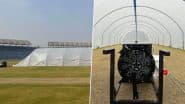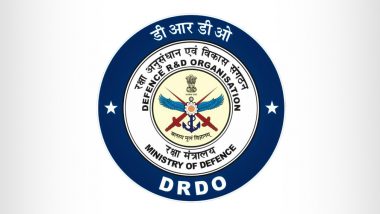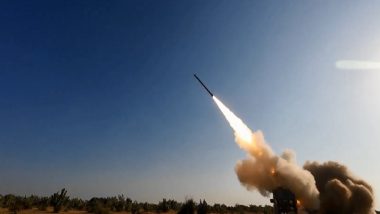New Delhi, Jan 24: Many critical systems and technologies developed by the country’s Defence Research & Development Organisation (DRDO) will be showcased during the 75th Republic Day Parade at Kartavya Path on January 26, the Defence Ministry said on Wednesday.
Women scientists of DRDO have made a valuable contribution in core areas of defence research and this will be prominently highlighted in the DRDO tableau based on the theme ‘Women power in protecting the nation by providing the defence shield in all five dimensions namely land, air, sea, cyber, and space,’ according to the official statement. Republic Day 2024: Traffic Likely to Be Affected in Central Delhi During R-Day Parade Rehearsal, Police Issue Advisory.
Outstanding Scientist Sunita Devi Jena will be the Contingent Commander. The tableau displays Man Portable Anti-tank Guided Missile (MPATGM), Anti-Satellite (ASAT) Missile, and Agni-5, Surface-to-Surface Ballistic Missile, Very Short Range Air Defence System (VSHORADS), Naval Anti-Ship Missile–Short Range (NASM-SR), Anti-Tank Guided Missile ‘HELINA’, Quick Reaction Surface-to-Air Missile (QRSAM), Astra, Light Combat Aircraft ‘Tejas’, ‘Uttam’ Active Electronically Scanned Array Radar (AESAR), Advanced Electronic Warfare System 'Shakti', Cyber Security systems, Command Control Systems and the Semi Conductor Fabrication Facility.
The Anti-Satellite (ASAT) Missile used in Mission Shakti was a major breakthrough in demonstrating the nation’s technology and precision strike capability. India is the fourth country to acquire such a specialised and modern capability. Agni-5 is the surface-to-surface ballistic missile capable of striking targets with a high degree of accuracy.
Indigenously developed MPATGM is a third generation ATGM with ‘Fire & Forget’ ‘Top Attack’ and night operational capability.
It is launched from a man portable launcher, integrated with thermal sight. NASM-SR is the first indigenous air launched anti-ship missile system. VSHORADS is a Man Portable Air Defence System meant for neutralising low altitude aerial threats at short ranges.
Helicopter-launched Nag is the third generation, fire and forget Anti-Tank Guided Missile that can engage targets in direct hit mode as well as top attack mode. The system has all-weather day and night capability and can defeat battle tanks having conventional as well as explosive reactive armour, the statement explained. Republic Day 2024: Delhi Police Takes Stock of Security Arrangements Ahead of R-Day Celebrations on January 26 (See Pics).
The QRSAM is an all-weather, air-defence system that provides mobile air defence cover to mechanised assets of the Indian Army in the Tactical Battle Area. ASTRA, is a state-of-the-art beyond visual range air-to-air missile to engage and destroy highly manoeuvring supersonic aerial targets.
LCA Tejas is indigenously developed light-weight and multirole 4+ generation tactical fighter aircraft which can carry laser guided bombs and modern missiles to cause extreme damage to the target. Uttam Active Electronically Scanned Array Radar (AESAR) is a multimode, solid-state active phased array fire control radar with scalable architecture that can be adapted for various types of fighter class of aircraft.
Advanced Electronic Warfare (EW) System ‘Shakti’ has been designed and developed for the Indian Navy for the interception, detection, classification, identification and jamming of conventional and modern Radars.
Many other systems/technologies developed by DRDO will also be displayed at Kartavya Path in various contingents of the Armed Forces. This includes Pinaka, Nag Missile System, mobile bridging system ‘Sarvatra’, Medium Range Surface to Air Missile (MRSAM), Weapon Locating Radar ‘Swathi’ etc. The fly past of the Indian Air Force will include LCA Tejas and AEW&C developed by DRDO, the Defence Ministry further stated.
(The above story first appeared on LatestLY on Jan 24, 2024 01:43 PM IST. For more news and updates on politics, world, sports, entertainment and lifestyle, log on to our website latestly.com).













 Quickly
Quickly





















